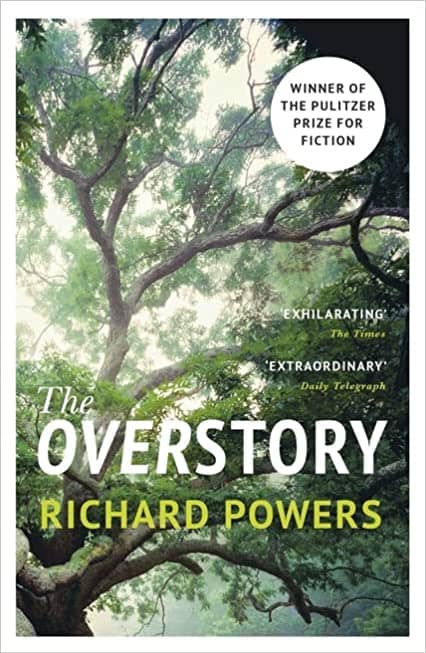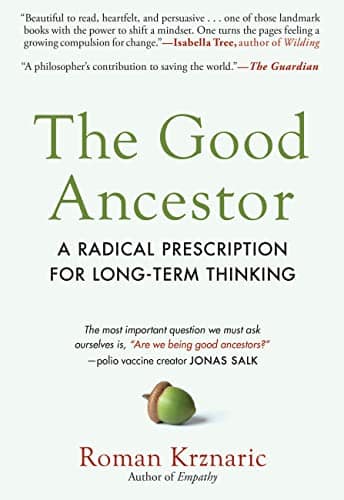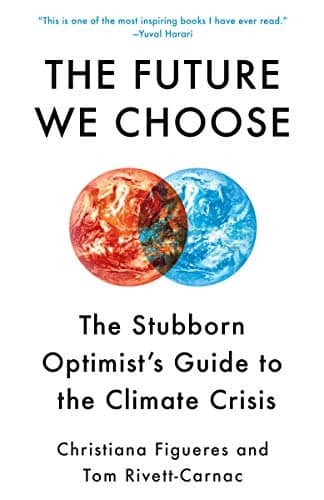Our team dug deep into our favorite titles to uncover what we believe to be the most inspirational books on sustainability. From philosophical approaches to climate change and award-winning climate fiction, to the shocking stats on global warming, these works of literature will give you a better feel for the challenges and successes of sustainability initiatives around the world.

The Overstory, by Richard Powers
A favorite of many Metabolic staffers (and a top pick for gifting to our beloved interns), The Overstory follows nine people and their relationships with nature, particularly trees. Among the growing genre of climate fiction, the novel won the 2019 Pulitzer Prize for Fiction and was shortlisted for the 2018 Man Booker Prize. “Writing The Overstory quite literally changed my life, starting with where and how I live,” Richard Powers has said. The more you learn about the history of trees and immerse yourself in their world, the more we think reading this book could have the same effect as it had on the author.

The Good Ancestor, by Roman Krznaric
This book by public philosopher Roman Krznaric helps readers change their thinking to become a “good ancestor,” leaving the world a better place for future generations. Many of us want to think long-term, but actually doing that is more difficult. Krznaric is here to help: “Humankind has always had the innate ability to plan for posterity and take action that will resonate for decades, centuries, even millennia to come.… Now is the time to recover and enrich this imaginative skill.” He outlines six ways we can learn to think long, backed up by real innovations from around the world.
“It has a lot of examples of people who embarked on projects whose outcome they would never get to enjoy, and it has practical advice on how to think that way,” said Metabolic Software Director Markus Appelman. His takeaway from the book: “Like always when I read philosophy: That what we think makes us happy and what actually makes us happy is not the same thing.”

The Future We Choose, by Christiana Figueres and Tom Rivett-Carnac
With so many news headlines about climate change filling us with dread and hopelessness, to the point that some might feel like nothing can be done, this 2020 book is a welcome change. In what is described as a “cautionary but optimistic book,” Christiana Figueres and Tom Rivett-Carnac — two of the leaders of the 2015 Paris negotiations — outline two possible scenarios for our future: One where we fail to meet the Paris climate targets, and another where we live in a carbon-neutral, regenerative world. They argue that we can choose which path to take, and that we can still be optimistic about our future.
“It addresses what I consider the hardest part of fighting climate change — what we call the mindset transition — with practical advice,” said Appelman. “I learned that even though the negotiations were frustrating and insufficient, there is still optimism.” This book is a great choice for anyone who wants to imagine a better, more optimistic scenario.

The Uninhabitable Earth: Life After Warming, by David Wallace-Wells
“A sobering, facts-heavy book that explains in great detail how our Earth’s situation is much worse than we even thought.” That’s how Metabolic’s Luuk de Vlieger, a front-end developer, describes this 2019 book. If our previous recommendation is too positive for you, consider this doom-and-gloom bestseller that lays out the cold, hard facts. In this “epoch-defining book” (The Guardian) and “this generation’s Silent Spring” (The Washington Post), David Wallace-Wells, a columnist and deputy editor at New York magazine, shocks readers with his stats: if we don’t limit global warming to 1.5 degrees Celsius, we’ll see 150 million premature deaths from the end of the century due to air pollution. That’s the equivalent of 25 Holocausts or twice the deaths from World War II — and he says that’s the best scenario. “No one will avoid the ravages of warming,” he told Vox. Despite the bleak warnings, he also says it’s not too late to keep making changes.

Braiding Sweetgrass: Indigenous Wisdom, Scientific Knowledge, and the Teachings of Plants, by Robin Wall Kimmerer
Is our Earth a resource — or a beloved family member? In this 2013 bestseller, botanist and Native American Robin Wall Kimmerer argues that plants and animals are our oldest teachers, and we should listen to them to learn to care for our planet. This message resonated with our Agrifood Sustainability Consultant Willow Sommer. “Regenerative agriculture, society, and culture are relational things,” she said, “built through changing relationships between humans and among humans and the Earth, plants, animals, the economy, and more.”
Combining memoir, science writing, and Indigenous American philosophy and history, the author offers an alternative approach to Western science. “I loved how it persuades you through feeling,” Sommer said. “It makes concepts that seem so difficult to enact become absolutely inevitable by communicating an intuitive sense of truth.” She recommends that everyone reads this book, since the author successfully translates niche concepts into a widely understandable feeling.

End State, by James Plunkett
End State takes a look at nine ways that governing systems are failing in the 21st century, and nine ways they might evolve. A favorite of our Consultant Andrew McCue, the book hypothesizes that we are living through a redefinition of society and governance on par with the turbulence of the Industrial Revolution. Then, as now, new technologies and social structures ran ahead of antiquated governments, led to environmental and human damages, and eventually catalyzed some of the greatest advances in democracy, human rights, and health as a result. “James Plunkett offers nine very practical evolutions that are already underway to build a more prosperous, sustainable, just, and healthy future,” McCue says.

Unbowed: A Memoir, by Wangari Maathai
Wangari Maathai may not be a household name, but she should be. She is the first African woman, and the first environmentalist, to win the Nobel Peace Prize. In Unbowed, she recounts her extraordinary life as a political activist, feminist, and environmentalist in Kenya. Her Green Belt Movement spread across Africa to help restore indigenous forests while paying rural women to plant trees in their villages.
“This is one of those books that reminds you to trust in your convictions,” said Sommer, who believes this book is great for anyone interested in international environmental politics or reforestation projects. “I loved seeing a vivid example of something that I’ve read conceptually, how development and environmental protection can go well together when they are grounded and steered by community and respect.”




